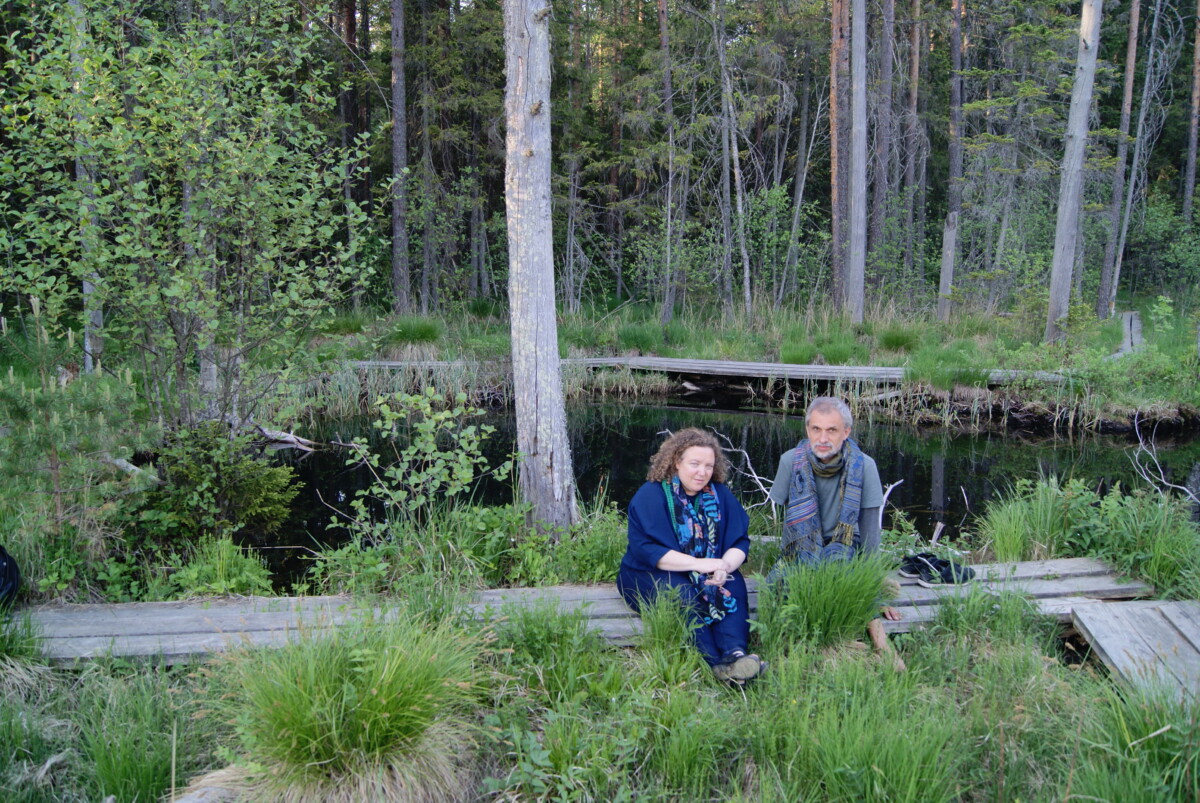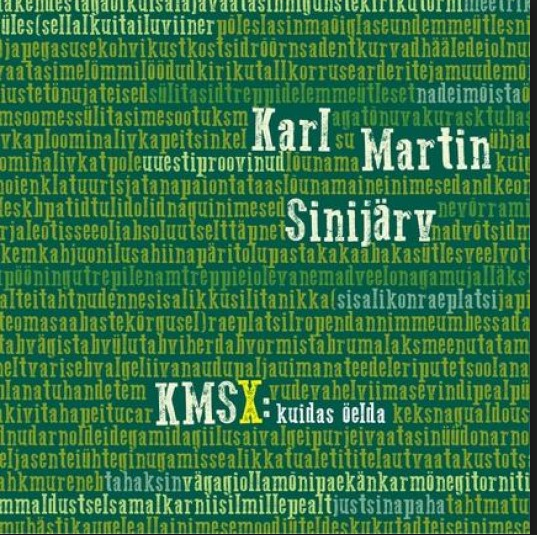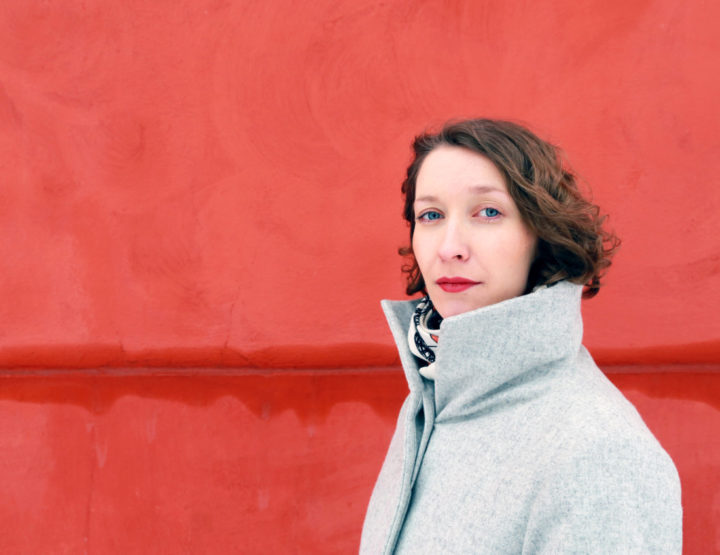Gili Haimovich and Mathura first met at a poetry festival in Romania seven years ago and have since enjoyed a long-standing collaboration. In 2018, a collection of Mathura’s poems was translated by Gili Haimovich into Hebrew and published. More recently, Avak Vetzvaem (Dust and colors – collection of Jaan Kaplinski’s poetry) was also published in Hebrew, translated and edited by Haimovich, with Mathura acting as advisor on poem selection and linguistic nuance. Now, a collection of Haimovich’s poetry is being prepared for publication in Estonian. The following conversation took place in Tartu this January, after a conference on Jaan Kaplinski.
Mathura: What is the value of being a poetry translator?
Gili Haimovich: The value is extending my consciousness. The translated work can be very different from my work but, in the process, it becomes part of my psyche in a way – in the way I internalize it. Translation allows for greater intimacy with the work than when just reading it. And I think there is a quality of finding and being found to it as well, especially when the origin seems very remote from me at first glance. Translation is an opportunity to ask myself, how much of a vessel can I be? Where is it that I begin and where do I end? Are there even any clear boundaries between the two? Sometimes, I think of translation as an act of carrying water – water will always take the shape of its container, but in its essence, it remains the same.
GH: Can I ask you the same?
M: I think for me, it is the chance to look at the world through someone else’s eyes; not only in the sense of what I see but also in the sense of creating associations, finding new forms of expression, and placing oneself in the world. Translating makes me acutely aware of the multiple possibilities for looking at the world and rendering it a meaning, or leaving it bereft of one. And of course, I agree, translation is a form of close reading, too. You engage with the work rather differently than you do by just reading it, even if diligently.
GH: You write a lot about places while still being connected to where you come from. Does being engaged with different places help you explore yourself in different ways?
M: My main interest in writing about different places and different landscapes is to explore the ways that people are connected to the land and landscapes in general. Meaning, first of all, materially, i.e. what is their connection to the soil, the nature. When I write about a landscape that is not native to me, I am often adopting a certain persona to explore what it would mean to be rooted in that landscape. It is as if I’m asking myself who I would be if this was my landscape, my land. And I guess my whole engagement with the topic ultimately relates to the sense of one’s roots being important. I believe that, in these times of growingly diluted identities, it is ever more important to have at least some sense of where we come from, and where our roots are. For he who has no roots, will soon be blown away by the wind.
M: If we were to consider poetry as an act of communication, then what do you perceive to be its main means?
GH: I’m a bit conflicted as to how communicative I would even want to be. My initial way to recognize myself is by objecting to what is around me. I used to think that writing is more about communicating with myself, but I guess if it were only that, I wouldn’t publish. Thinking back to the very beginning though – there is maybe almost an awful truth that – there was once something unspoken. Something that had no other way of being referred to except for in writing. This was my chance to look for ways to express myself, even if I didn’t always find them. I started to write as a child when it was even harder to stand my ground. In general, I would like to communicate through my writing, but maybe if I were too exposed to that need, I would feel too vulnerable to write altogether.
GH: Do you think of the end when you write? In terms of communication?
M: Not at the moment of writing, no. But I do approach writing as communication. I believe that, as people, we require communication with each other, and writing offers a way to express things that might otherwise stay unexpressed. However, I agree that even if we were to regard poetry as an act of communication, it can take two directions – it can also mean communicating with oneself, understanding yourself better, making better sense of something, or being relieved of something. I think more of the recipient when I’m editing a book. Nevertheless, if the work happens to resonate with anyone, I believe this is mostly a result of something beyond the words or semantics, related more to the intent of the writing. And even if I have written something on a piece of paper that I will never show to anyone, it is still an act of communication, for I had the option of saying nothing. Of leaving the page blank.
M: What is the success of poetry or translation for you? Or is success instead a notion that doesn’t come into the picture at all if we’re talking of poetry?
GH: Poetry is, in the end, the only thing I engage myself with, either as an author or translator. Of course, I would want to succeed in it, feeling almost as if I’m no good for anything besides it. The success of writing can, however, also mean something very immediate for me – like when I have insomnia and writing helps me fall asleep.
In general, it is the process itself that is more gratifying than the end result. Of course, I’m very happy when people read my poems or when they get translated, but maybe poetry is also about the gap between our feelings, thoughts, or perceptions of things and what they truly come to be. So, in this way, there’s always disappointment waiting down the line along with the success for a writer. On a more positive note, however, I never had the intention of being a poet, I never knowingly asked for it. Therefore, sometimes almost everything is a success. I’ve fulfilled many dreams I didn’t have to begin with. I believe that wanting leaves one very vulnerable, it is better to arrive free of anticipation.
GH: When you write, do you look for a certain core of a landscape to explore? Or do you look for what is beneath the visible? Is that what writing enables you to do?
M: Yes. The roots are beneath the visible, so if you’re going to deal with them, you need to dig below the surface of things. Of course, sometimes the roots can grow through the pavement, as in one of your poems, which is also a metaphor for something that has been out of sight, but now becomes impossible to ignore. I believe everything tangible rests on something more subtle and this is what I’m looking for, or at, in all my writing.
M: What is the one poem you would recommend to someone who is not familiar with Jaan Kaplinski’s poetry?
GH: I think it would be unfair to name just one poem, or even just a few poems. His work is more about the overall texture and how the poems correlate with each other, than the value of any singular standalone poem. That is one thing I find particularly unique in his work. My favorite poems are: “It was a spiking cold winter night when the boys brought them from Tallinn” (“Oli kärekülm talveõhtu”) and “My aunt knew them well” (“Mu tädi tundis neid hästi”). As well as “In every dying man” (“Iga surija”), “One day you will do everything for the last time: breath, make love” (“Kõike teed kord viimast korda: hingad, seksid”), and “The wind sways the lilac branches and shadows” (“Tuul õõtsutab sirelioksi”), and even more. But if I were to think about your poems, I would say the poem “Separation” (“Lahusolek, I”), strikes a very particular chord in Israel and Hebrew.
—-
Gili Haimovich (b. 1974) is an international prize-winning poet in Hebrew and English, as well as a poetry translator and visual artist. He is also the author of six books in Hebrew and three in English, and an Israeli with Canadian citizenship.
Mathura, aka Margus Lattik, (b. 1973), is an Estonian writer, artist, and translator who has received several awards in Estonia for his poetry and novels. He has translated both contemporary and classical literature and has a long-standing interest in the cultures of the East. He lives in the Estonian countryside.





